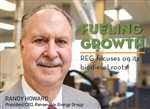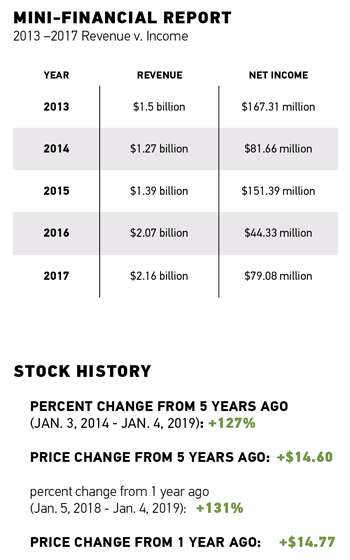Fueling Growth

Ames-based Renewable Energy Group saw its stock price more than double in 2018, from the $11 range to $25-plus. At one point in the past year, it hit $31. At the end of the year, interim President and CEO Randy Howard prepared to turn over those positions to former Andeavor and BP executive Cynthia “CJ” Warner. REG focused on its international play in biodiesel, including advanced biofuels. Howard will remain on the board, which he joined in 2007. He and other board members have strongly encouraged expansion of the industry. REG has applauded the federal government’s increase in the amount of renewable fuels refiners must blend, which helped boost the bottom line. But so did the company’s decision to focus less on acquisitions and more on producing and selling more of the biodiesel that made its name. While the company may still look into producing perfume ingredients and other specialty chemicals, that will be a sideline to efforts to boost the company’s various grades of biodiesel — which has become increasing popular with school districts and other fleet owners.
Ames-based Renewable Energy Group spent much of 2018 building on its capacity and looking to expand its core biodiesel business under interim President and CEO Randy Howard.
The company, which makes biodiesel from surplus fats, greases and oils, had seen the July 2017 departure of Daniel Oh, Howard’s predecessor, who had focused on buying smaller companies and had eyed getting into the specialty chemical business. Much of this year was focused on setting up the future.
“The six-plus months or so before [Oh] resigned, the board and management had worked on really kind of developing what’s the strategy to take REG to the next level,” Howard said.
“And at the end of that, you know, we concluded that the strategy was basically to invest in and organically grow the platform that we had. One of Dan Oh’s key attributes was he came out of the financial side and was really good with mergers and acquisitions. And so for the strategy that he employed that built REG, that helped roll up and merge a lot of different small biodiesel companies to create this wonderful platform, he was perfect. But by his own admission, when we put in the strategy to say, ‘Well, we’re not really looking at growing through mergers and acquisitions, we’re going to invest hundreds of millions of dollars into growing our renewable diesel platform and organically growing our our biodiesel platform,’ he said, ‘You know, you need somebody that has that kind of big company, large capital projects experience.’ And so the board asked me to step in as an interim, to bridge that gap.”
Eventually, 18 months of soul-searching, planning and succession planning ended with the hiring in late 2018 of Cynthia “CJ” Warner, a 35-year veteran of the energy sector, including leadership roles with Andeavor and BP, to succeed Howard beginning in mid-January.
Warner also spent five years working for a company that made synthetic crude out of algae. “So she, too, has been in the renewable space and has a passion for it,” Howard said.
With the company now profitable, Howard said the focus will be on big expansions. Plans at the Geismar plant in Louisiana alone call for more than a half-billion dollars in added equipment and plant capacity. At the same time, instead of selling everything wholesale, REG is focusing on fueling fleets such as Ruan, FedEx and UPS.
“If you think about the early days of biodiesel, it was a lot of us kind of creating product awareness, solving some of the technical issues, you know, growing the business and fundamentally getting a distribution network to reach the customers,” Howard said. “There are a lot of companies that do biodiesel, but we have a unique scope and scale with 11 plants across the U.S. and in Germany. So in the next five years you will continue to see us growing into that downstream market and having those customers come to us and say, ‘Hey, you know, we want renewable fuel in our trucks.” Part of that is because companies’ customers demand sustainability and renewable fuels are part of the answer.
From January through September 2018, the company’s fuels had the environmental effect of pulling 620,985 passenger vehicles from the road entirely, due to lessened emissions.
The company is aiming for more.
REG in 2018 announced a joint venture with Phillips 66 in Washington state to build a large renewable diesel facility. The exact size and price are pending the engineering work.
At Geismar, La., REG plans to expand its production to the tune of more than a half-billion dollars in equipment and capacity.
REG uses fats, oils and greases, and makes them into biomass-based diesel, some with a chemical process and some with refining using techniques similar to oil refining. The refining results in an “exact petroleum look-alike,” with no blend restrictions, Howard said.
In 2018, New York City tried 1.1 million gallons of renewable diesel for garbage trucks for six months in warmer months. “It went perfectly,” Howard said. “It’s a complete drop-in fuel with very low emissions, and it’s 100 percent renewable. They want to convert their municipal fleet to renewable fuel.”
Howard sees great market potential in California, which has laws pushing for sharp reductions in greenhouse gas emissions tied to gasoline. “With the automotive industry, there is some penetration with electric vehicles and all that,” Howard said. “But when you get to hauling goods to the marketplace, everything goes to the marketplace in a truck, train or ship, and they all burn diesel.”
The California Air Resources Board reported the state needs 1 billion gallons more renewable fuels and biodiesel, Howard said.
When Howard joined the REG board in 2007 to provide some oil-company experience, REG sold something in the range of 50 million gallons of biodiesel a year. In 2017, the company sold 500 million gallons.
“We sell renewable diesel to the Nordics, we sell to Canada, so this is an international market,” Howard said.
But REG is also looking internationally, perhaps surprisingly, to buy the fats, greases and oils that once were waste products and now are feedstocks for a growing business in Ames, Iowa.
“I think where you see us today focused internationally is on the feedstocks,” Howard said. It’s possible to economically ship the materials in from other countries, and REG does so occasionally, he added.
“If you think about our business, I like to compare it to chocolate candy. It’s this outer chocolate covering of environmental stewardship and sustainability, but the core of our business is value-added agriculture. Because we take typically agricultural waste products and add value to them and convert them” into renewable fuels.
The fats used to be fed to livestock. But the biodiesel is a better market, Howard said.
REG has helped a depressed soybean market by buying soy oil. The same goes for corn oil from the back end of ethanol production. So now ethanol plants separate corn oil out of the dried distillers grains that are worth about the same for animal feed, without the corn oil, which can then be sold to REG.
“So it’s a supply chain that has economics up and down because we basically touch the feedstock supplier, the farmer, the rancher, the soybean farmer, the ethanol plants, all the way to the trucker who gets cleaner fuel,” Howard said.
REG is making a play in the perfume industry with a small plant in Florida with a fermentation process that is making a “musk precursor” to sell to fragrance makers. “That product has gone well. We have commercial orders,” Howard said.
But the company’s focus will be on the biodiesel world. And stockholders appreciated REG’s 135 percent share price increase year-to-date through mid-December, compared with Nasdaq’s 7.8 percent.
REG, which formed in 2006 and went public in 2012, also bought Keck Energy in Des Moines to improve distribution of diesel and biodiesel in Central Iowa.










